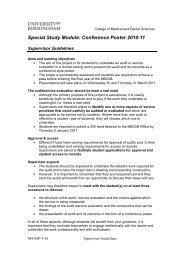Contents - College of Medical and Dental Sciences - University of ...
Contents - College of Medical and Dental Sciences - University of ...
Contents - College of Medical and Dental Sciences - University of ...
You also want an ePaper? Increase the reach of your titles
YUMPU automatically turns print PDFs into web optimized ePapers that Google loves.
The 11 th International Workshop on KSHV & Related Agents, Birmingham, UK<br />
Immunology II Abstract 43<br />
SCREENING FOR NATURALLY OCCURRING ANTI-KCP (KSHV COMPLEMENT<br />
CONTROL PROTEIN; ORF4) ANTIBODIES IN KSHV-INFECTED PATIENTS AND<br />
GENERATION OF SPECIFIC MONOCLONAL ANTIBODIES FOR PATHOGENESIS<br />
STUDIES<br />
Anna M. Blom 1a , Marcin Okroj, 1a Linda Mark, 1a Zoltan Korodi, 1b Rosamaria Tedeschi, 2<br />
Joakim Dillner 1b <strong>and</strong> O. Brad Spiller 3<br />
a Department <strong>of</strong> Laboratory Medicine, b Department <strong>of</strong> <strong>Medical</strong> Microbiology, 1 Lund<br />
<strong>University</strong>, <strong>University</strong> Hospital Malmö, S-205 02, Malmö, Sweden. 2 Department <strong>of</strong><br />
Microbiology, Oncological Center, Aviano 33081, Italy. 3 Department <strong>of</strong> Child Health,<br />
Cardiff <strong>University</strong>, School <strong>of</strong> Medicine, Cardiff CF14 4XN, United Kingdom.<br />
Abstract<br />
ORF4 encodes a complement regulating protein expressed in the late virus replication<br />
phase, referred to as the KSHV Complement Control Protein (KCP). KCP is expressed on<br />
the virion surface <strong>and</strong> can be induced on the surface <strong>of</strong> KSHV-positive primary effusion<br />
lymphoma (PEL) B-lymphocytes. KCP mediates protection from complement attack <strong>and</strong><br />
an integral heparin binding motif enables virion KCP to enhance virus infection through<br />
extracellular matrix binding. Using recombinant soluble KCP <strong>and</strong> transfected cells hyperexpressing<br />
various recombinant portions <strong>of</strong> KCP, serum from different KSHV-infected<br />
patient groups were investigated for anti-KCP reactivity. Specific anti-KCP IgG, but not<br />
IgM, was found predominantly in patients that had high titres <strong>of</strong> antibodies against other<br />
lytic KSHV proteins <strong>and</strong> the second (CCP2) <strong>of</strong> the 4 complement control domains in KCP<br />
was found to be the dominant epitope recognised. Patient anti-KCP antibodies enhanced<br />
complement attack on KCP-expressing CHO cells, suggesting neutralisation. Anti-KCP<br />
antibodies were found in all KSHV-infected lymphoma patients except one examined, but<br />
only 3/16 KS patients, suggesting differential KCP expression between these two<br />
diseases. Recombinant soluble <strong>and</strong> cell-expressed KCP were used to generate <strong>and</strong><br />
characterise monoclonal anti-KCP antibodies against each CCP domain. These<br />
monoclonal antibodies differentially regulated decay-accelerating factor activity, c<strong>of</strong>actor<br />
activity <strong>and</strong> heparin binding. Primary conjugated anti-KCP monoclonal antibodies<br />
labelled with FITC, PE, APC or HRP have now been created <strong>and</strong> await appropriate KSHV<br />
patient groups for longitudinal flow cytometric <strong>and</strong> histological assessment through<br />
disease progression <strong>and</strong> treatment.<br />
Presenting author Email: spillerb@Cardiff.ac.uk<br />
69















